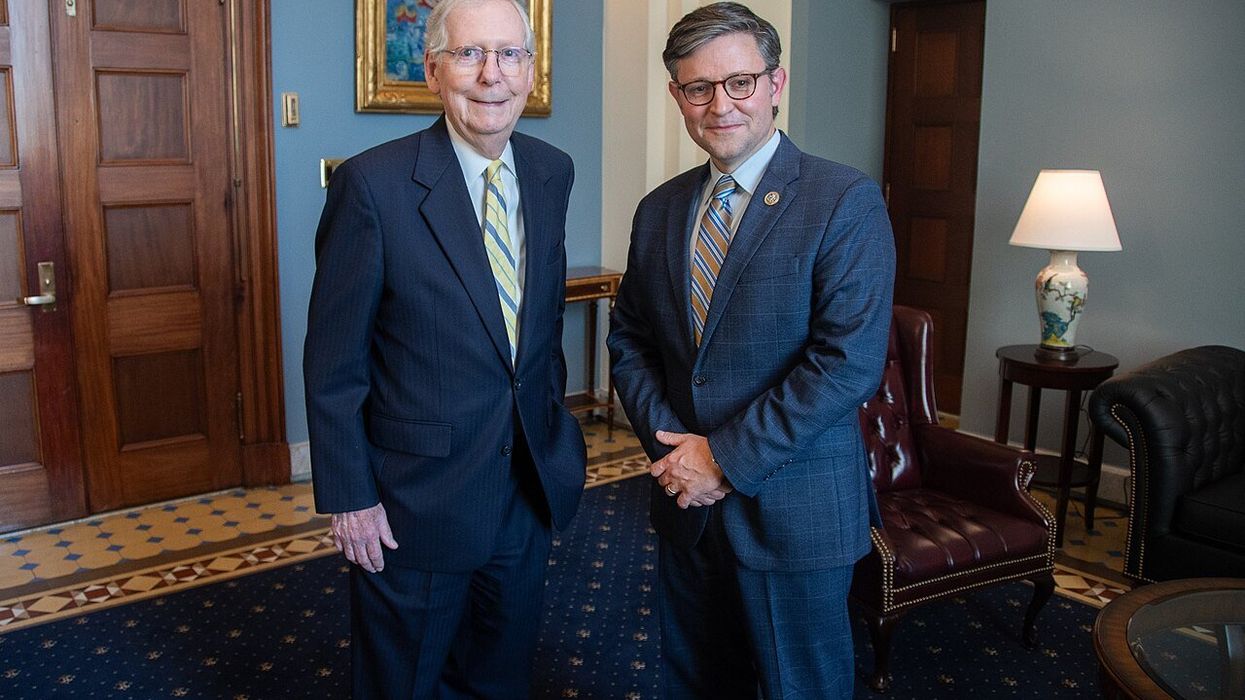
WASHINGTON, DC - JUNE 28: U.S. President Joe Biden talks to reporters as he departs the White House on June 28, 2023 in Washington, DC. Biden is traveling to Illinois to speak on what the administration has dubbed “Bidenomics" and to attend a campaign fund raiser before returning to Washington later in the evening.
Some of the media are preoccupied with a baffling question; Why are Americans not celebrating the economic accomplishments of the Biden administration?
A poll from the Suffolk University Sawyer Business School and USA TODAY released this September reported that 70 percent of Americans believe the economy is worsening; 84 percent said their cost of living was rising.
The Associated Press-NORC Center for Public Research reported this August that 36 percent of adults approved of the Biden administration’s direction of the economy.
A CNN poll this July reported that 58 percent think that his policies have exacerbated the economic conditions in the U.S. This is an increase of 8 points since last fall.
It is important to realize how structural components of our economic model maintain chronic economic burdens plaguing working people; the numbers above provide an economic dashboard they live every day
Highly regarded progressive author and radio talk show host Thom Hartmann asserted that the problem for the Biden administration is the fault of the corporate media to report those economic accomplishments.
But those accomplishments are, well, just not enough for some people and many Americans do not recognize them for valid reasons.
It has been suggested that it is the result of a mass “menticide,” a scientific term from Latin meaning “a killing of the mind.” Webster’s defines it as “a systemic and intentional undermining of a person’s conscious mind.” Perhaps Americans are susceptible to the pathological normalization of lies spread by Mr. Trump and his collaborators.
Hourly Wage/Earnings Reports
That Suffolk University Sawyer Business School/USA poll also reported that many Americans trust Mr. Trump to improve the economy if re-elected. What makes this profoundly disturbing is the actual economic record of Mr. Trump. His administration did virtually nothing to ameliorate the daily lives of working people.
FactCheck listed many of the Trump Administration’s economic failures. However, one measure should be mentioned for clarification.
The Trump administration was credited by FactCheck in a Bureau of Labor Statistics (BLS) interactive chart from January 2012-July 2022 with increasing average weekly earnings by 8.7 percent.
However, applying the BLS standard method of CPI-U, the real wage seasonally adjusted average hourly increase was 7.1 percent during the Trump years.
The increase still appeared to be a success. Yet, the year of January 2020 to January 2021 was a time when the country suffered the anguish of the Covid-19 virus.
Dean Baker of the Center for Economic Policy Research observed during that time 20.5 million employees were released; most jobs lost were from the low end of the wage scale. This skewed average wages artificially higher.
Factcheck’s method reported average weekly earnings from a BLS website already cited. The standard BLS method is to report average hourly earnings which is more accurate because the length of the workweek is a variable.
For example, an employee earning $30 an hour working 35 hours earns less than an employee working 40 hours a week though both are at the same pay rate. That is not a pay increase. Working more hours for different reasons skews the average artificially higher.
The Trump administration’s 8.7 percent increase in weekly earnings is a misrepresentation. The hourly wage is a more accurate number at 7.1 percent, though still with the two flaws already demonstrated.
Administrations’ Effect
Actually, presidential administrations do not significantly affect the trajectory of our economic model in basic income numbers. Monetary and fiscal policies can temporarily mask the worst excesses.
However, the underlying economic relationship between the dominant economic class and both the working middle class and working class determines earnings as wages and salaries.
Most economists realize that the president does not have a significant effect on those earnings as wage and salary numbers.
Nevertheless, the impression is cemented into our political culture that it does; a large majority of Americans will blame a president rather than question the economic model responsible for their economic burdens. Subsequently, it is usually manifested in national elections.
A review of the real wage seasonally adjusted average hourly percentage during the Biden administration is not impressive so far. The Biden administration began in January 2021. The real wage seasonally adjusted average hourly percentage through this September decreased at -4.3 percent.
This percentage does not provide the Biden administration with a much-needed victory but rather another reason why working people are not so enamored by its economic accomplishments.
Cost of Living
Earnings as wages and salaries depend on a number of variables such as occupation, industry, education level, location, and demographics.
A more accurate method for determining how income affects working people is to compare the percentages against a realistic cost of living framework. The cost of living varies notably in different regions of the country.
The Economic Policy Institute has a trenchant cost of living measure. It is a Family Budget Calculator and calculates a monthly minimum standard of living measured by housing, food, childcare, transportation, other necessities, and taxes.
For example, in the Boston, Massachusetts area, a working family of two parents and two children would require $131,028 to meet an “adequate “standard of living. In the Jackson, Mississippi area the amount required is $76,848. In the Sante Fe, New Mexico area, the amount required is $81,217. In the Oklahoma City, Oklahoma area, the amount required is $82,545. In the Los Angeles/Long Beach/Glendale, California, area the amount required is $102,626. In the Salem, Oregon area the amount required is $89,412.
When reviewed against the current household income of earnings as wages and salaries, the vast majority of working people have no reason to celebrate.
It is more dispiriting when an “Economic Tree” is taken into consideration. The trunk of the tree are earnings as wages and salaries. The branches of the tree are healthcare, housing, education, nutrition, transportation, and the environment. Again, working people are not receiving their fair share in these basic social requirements.
Personal Economy
The "personal economy” is largely unreported in the corporate media. The "personal economy” reframes the issue from standard numbers to a clearer view of the daily economic burdens faced by all working people.
Unemployment
The Ludwig Institute of Shared Economic Prosperity (LISEP)
Using data compiled by BLS, the True Rate of Unemployment tracks the percentage of the U.S. labor force that does not have a full-time job (35+ hours a week) but wants one, has no job, or does not earn a living wage, conservatively pegged at $20,000 annually before taxes.
LISEP reported this September an unemployment rate in September at 22.8 percent.
The BLS reported the September unemployment rate at 3.8 percent.
Shadow Government Statistics (SGS)
Using data from the BLS, SGS included workers who stopped looking for a job for one year, but were inexplicably removed from the BLS reports in 1994.
SGS reported in June that the unemployment rate in May was 25 percent.
The BLS reported the May unemployment rate was 3.7 percent.
Asset Limited, Income Constrained, Employed (ALICE)
Using their measures ALICE created an Essentials Index.
The ALICE Essentials Index measures the increase over time in the costs of the essential goods and services that households need to live and work in the modern economy. These minimum costs are itemized in the ALICE Household Survival Budget.
The ALICE Essentials Index includes only essential household expenses, i.e., child care, food, transportation, health care, and a smartphone plan.
From 2007 to 2023, the average annual increase for the ALICE Essentials Index was 3.3 percent, while the standard Consumer Price Index increased by 2.5 percent on average for U.S. households in 2021.
A troubling 29 percent of ALICE households earned above the Federal Poverty Level but not enough to afford the basics in the communities where they live. Even worse, 41 percent of households were below the ALICE threshold of poverty.
If 29 percent of American household were just above and 41 percent of households were below this poverty measure, it is reasonable to conclude that an appalling number of households are living around the poverty line.
More Numbers
A Bankrate report in June this year stated that 48 percent of Americans have only enough emergency savings to last three months and 57 percent are “uncomfortable with what savings they do have.”
A report from the Federal Reserve Bank of Dallas in October 2022 provided numbers that earnings as wages and salaries of U.S workers are falling further behind.
Another corporate con that affects earnings is “shrinkflation.” The BLS released a report this February describing it. It ss the downsizing of household commodities in size and packaging. The result is a subtle method for companies to increase profits and reduce the purchasing power of working people.
Not much for working people to celebrate here.
Working Peoples’ Quandary
The numbers confirm that the “personal economy” does not allow for the vast majority of working people to maintain comfortable living conditions.
Their earnings as real wage and salary percentages are decreasing during the Biden administration; the cost-of-living threshold is squeezing the vast majority of working people with no relief in sight. It is a grinding pulverization that cannot be varnished over with glossy commercials and fanciful essays of wishful pundits.
Our country continues a trend toward a spiritual malaise and a secular decomposition. It is important to realize how structural components of our economic model maintain chronic economic burdens plaguing working people; the numbers above provide an economic dashboard they live every day.
It answers why the Biden administration’s economic accomplishments do not resonate with a substantial majority of working people.













